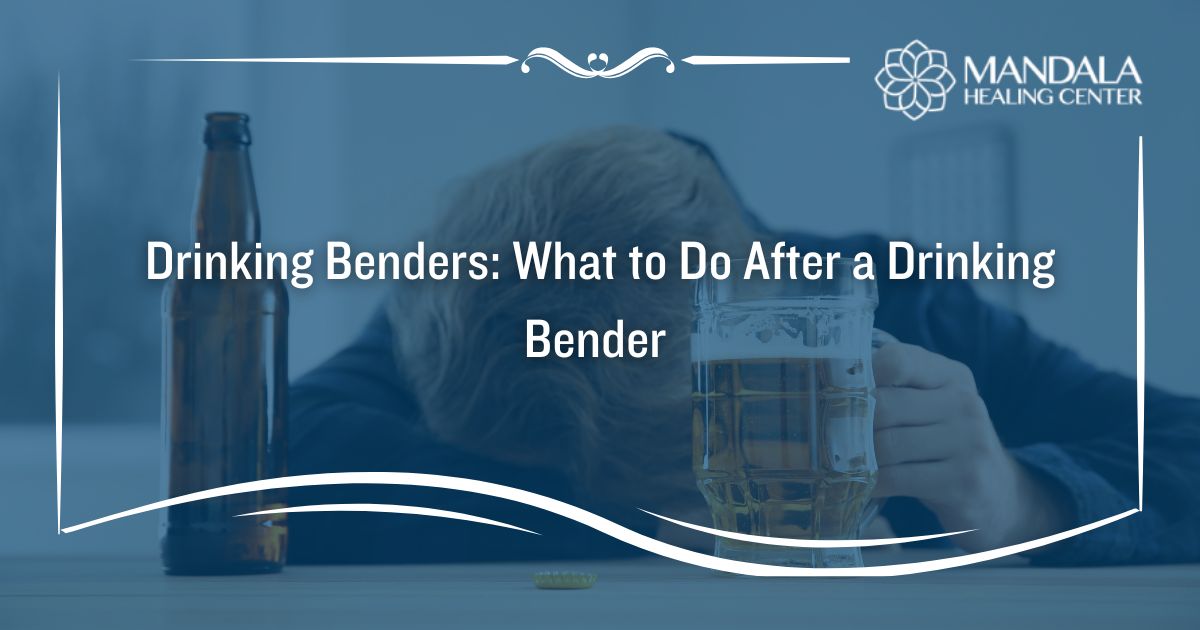Alcohol is the most commonly abused substance in America. While it is okay to drink alcohol occasionally, some people have a hard time controlling how much they use. When you struggle with managing your alcohol consumption, you are at risk of developing an alcohol use disorder.
According to the National Institute on Alcohol Abuse and Alcoholism (NIAAA), nearly 30 million people had alcoholism in 2023.[1]
Another sign of alcohol use disorder is engaging in binge drinking. This pattern of alcohol use is characterized by consuming large amounts in a short time frame. Binge drinking is consuming 4 or more drinks in one sitting for women and more than 5 drinks for men.[2]
Binge drinking is also referred to as going on a “drinking bender.” It means you’ve consumed a lot of alcohol in a short time frame or consecutively over a few days. Unfortunately, this type of alcohol use is incredibly dangerous and often leads to the development of alcoholism.
In this article, you will learn:
- What is an alcohol bender?
- What are the dangers of excessive drinking?
- What should you do after a bender?
What is a Drinking Bender?
An alcohol bender or drinking bender is a period, usually a few days to a week, of excessive binge drinking and alcohol consumption.
To better understand what a drinking bender is, you need to know how much a standard drink is. A standard drink or a single serving of alcohol could be:[3]
- 12 ounces or one bottle of 12.5% ABV beer
- 8 ounces or one bottle of 7% ABV malt liquor
- 5 ounces or one small glass of 12% ABV wine
- 1.5 ounces or one shot of 80 proof hard liquor
Your body processes a single serving of alcohol per hour. If you are trying to avoid raising your blood alcohol concentration (BAC), you’d need to limit your alcohol consumption to one drink per hour. However, most people who go out drinking at bars or clubs consume more than this, raising their blood alcohol levels and getting drunk.
Binge drinking is defined as having 4 or more servings of alcohol for women or 5 or more for men. Binge drinking is considered dangerous as it increases the risk of developing adverse health effects from alcohol abuse.
Even though binge drinking is a form of heavy drinking, alcohol or drinking benders are more extreme. Instead of one binge drinking session, a bender occurs when someone binge drinks for multiple days at a time. Drinking alcohol in this manner increases the risk of alcohol poisoning, overdose, addiction, and developing short-term and long-term health issues.
What are the Risks of Excessive Drinking?
Benders are an extreme form of excessive or heavy drinking, which is defined as having 8 or more alcoholic drinks per week for women and 15 or more alcoholic drinks per week for men.[2]
The short-term risks of going on an alcohol bender include:[2]
- Injuries from car crashes, accidents, falls, and more
- An increased risk of engaging in or being the victim of violence
- Alcohol poisoning and overdose
- Developing STIs or accidental pregnancies
- Miscarriages, stillbirths, or fetal alcohol spectrum disorders among pregnant women who drink
You can experience the following long-term effects when you go on a bender:[2]
- Various forms of cancer
- Heart and liver disease
- Stroke
- Weakened immune system
- Alcohol use disorder
- Increased mental health problems
- Memory issues and dementia
- Learning problems and mistakes at school or work
- Interpersonal and relationship issues
Excessive drinking, like alcohol benders, leads to about 178,000 deaths per year in the United States.[2] In other words, engaging in this behavior simply isn’t worth it.
What Should You Do After an Alcohol Bender?
If you consume large amounts of alcohol for several days at a time, you went on a drinking bender. Once you stop drinking, you’ll probably experience a severe hangover.
If you have been engaging in this behavior for a long time, you may have become addicted to alcohol. Symptoms like shaking or tremors, vomiting, restlessness, sweating, fast heart rate, and others might indicate that you are experiencing withdrawal. Because alcohol withdrawal can be life-threatening in severe cases, you should seek help from a medical detox center.
Detox and an alcohol rehab program can help you develop the tools and skills you need to achieve long-term sobriety from alcohol. While you might not be sure if you have an alcohol use disorder, it’s best to err on the side of caution. Seeking help from a treatment program like the Mandala Healing Center will only improve your overall quality of life and help you overcome substance abuse issues.
Get Connected to a Top-Rated Alcohol Rehab Program
If you or a loved one is suffering from frequent and heavy alcohol use, it might be time to seek help for alcoholism. At the Mandala Healing Center, we offer an individualized and evidence-based approach to treating alcohol use disorder. In other words, you’ll receive all of the tools and support you need to regain control over your life.
Contact us today for more information on our alcohol addiction treatment program.
References:
- The National Institute on Alcohol Abuse and Alcoholism (NIAAA): Alcohol Use Disorder (AUD) in the United States
- The Centers for Disease Control and Prevention (CDC): Facts About Excessive Drinking
- The Substance Abuse and Mental Health Services Administration (SAMHSA): Alcohol Use Disorder
















